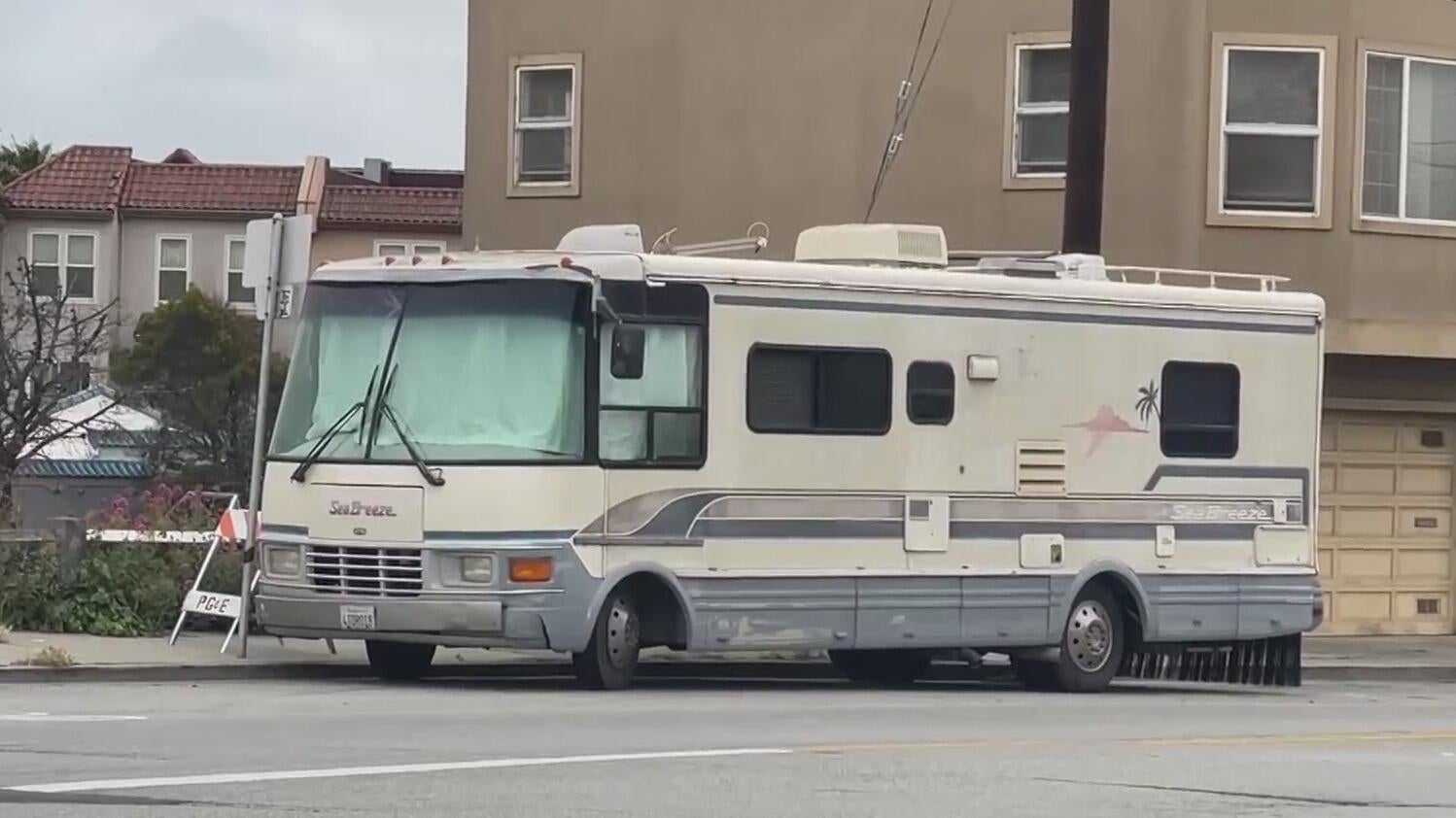San Francisco mayor proposes 2-hour parking limit for RVs, expansion of homelessness outreach, housing
San Francisco Mayor Daniel Lurie unveiled a new proposal Tuesday to restrict long-term parking by recreational vehicles to two hours and expand outreach to unhoused persons living out of their vehicles.
Lurie's plan would restrict parking for large vehicles to two hours citywide, 24 hours a day and seven days a week. The legislation he proposes would also offer interim or permanent housing to individuals and families sheltering in vehicles, earmarking $13 million over two fiscal years for rapid rehousing, a vehicle buyback program, outreach, and enforcement.
The mayor's proposal would also allow homeless persons in RVs a short-term permit to remain parked beyond the two-hour limit if they are actively engaging in the services offered by the city.
But the last time the city tried to show concern, it was a monumental failure. All that is left of the Bayview Vehicle Triage Center at Candlestick Point is an empty parking lot, blocked off with barriers and choked with weeds.
The safe parking site was built in 2022 with bathrooms, showers and 24-hour monitors, which ended up costing the city $140,000 for each parking spot. Facing ridicule, the city shut it down in March.
"We're really scared for them," said Jennifer Friedenbach, executive director of the Coalition on Homelessness, SF. "I mean, we're working with a lot of folks in RVs and, you know, their biggest fear is that they're going to end up out on the streets. And that is a very high likelihood with this proposal."
A Bayview man named Theo said he has tried to get a place for years, without success.
"I work five days a week. I'm a plumber for San Francisco," he said. "And rent here is just extremely high. It's unbelievable. I'm on a list, and I never get called. And I submit my work stub tickets to verify I'm working and have income. And I never get a call back. So, this is where I reside."
Theo is trying to do things the right way. With a small inheritance from his grandfather, he bought an RV as a way to stay in his hometown. It is insured and runs fine, and he tries to be a good neighbor to the people he parks nearby.
"I don't even own any animals, but I've got dog treats," he said. "I've got bags of dog treats for all the neighbors who walk their dogs. I know them all by name."
He admits that many homeless residents cause trouble for the city, but under the Lurie proposal, Theo's RV would be treated the same as everyone else's.
"They're not concerned. They just want it cleaned up," he said. "They're not concerned about where they go or the well-being of the people that are in struggle. They just want to clean it up, and they're not giving alternatives for that."
Last month, the city conducted an audit of vehicular homelessness and identified 501 large vehicles parked on the streets, with 437 used for dwelling, the Mayor's Office said. In a press release, the office said the city's interagency response to vehicular homelessness, combining outreach, expanded services, and parking enforcement, would restore public spaces while prioritizing the dignity and well-being of people living in their vehicles.
Under the proposal, large vehicles without a "refuge permit" would be cited and potentially towed away. The operations would begin in what the city called "high-impact areas" led by neighborhood street teams led by the city's Department of Emergency Management.
Parking enforcement
The San Francisco Municipal Transportation Agency and Police Department would enforce the parking restrictions when towing services are needed. The SFMTA will introduce companion legislation to its board on the parking enforcement, contingent on the city's Board of Supervisors' passage of the legislation, the Mayor's Office said.
"For far too long, neighborhoods across San Francisco have borne the impacts of unregulated RV encampments - illegal dumping, blocked sidewalks, and public safety concerns," said Board of Supervisors president Rafael Mandelman. "This legislation creates a humane pathway for current RV residents to find stable housing, while making it clear that new RV encampments will not be allowed and our streets will not continue to serve as shelter of last resort."
In December, supervisors voted to reverse a ban on RVs from parking overnight on public streets. Critics said the ban would allow authorities to tow RVs and other large vehicles at the agency's discretion, and that the city doesn't have enough housing available for people who are living out of their vehicles.
The ban had been proposed by former Mayor London Breed and approved by the SFMTA in October. It expanded what the city defined as a large recreational vehicle to include mobile homes, box trucks, and other large campers.
"There should be a more comprehensive plan of how to address the fact that so many people, especially families, are forced to live in RVs because they can't afford apartments in San Francisco," Supervisor Dean Preston said at the time.
Preston left office in January after losing his re-election bid to Bilal Mahmoud.




